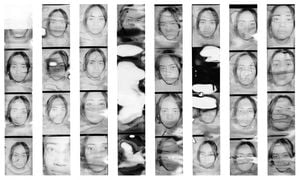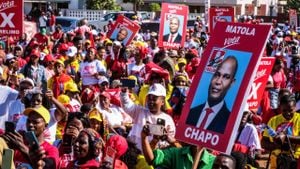The U.S. government has recently taken significant legal action against what it claims to be an Iranian plot to assassinate Donald Trump, stirring tensions not only between the two nations but also among various political factions.
On Friday, the Department of Justice unsealed charges against Farhad Shakeri, a 51-year-old Afghan national who allegedly had been contacted by Iranian officials with the directive to create plans for surveilling and potentially killing Trump before he ascended to the presidency. The government claims this directive was linked to Iran's elite Revolutionary Guard.
The Justice Department stated it had evidence showing Shakeri was directed to form strategies related to the assassination within just one week. Interestingly, Shakeri noted during questioning by law enforcement officials, he did not believe he could draft such plans expeditiously and suggested waiting until after the election to act, as he assumed Trump would likely lose.
Shakeri remains at large, reported to be located within Iran, where Iranian authorities have dismissed the allegations as “completely baseless.” Iran's Foreign Minister Abbas Araqchi condemned the U.S. for advancing what he branded as fabricated storylines, asserting, "The American people have made their decision. And Iran respects their right to elect the president of their choice." He reiterated the need for confidence-building and diplomatic respect between the two historically antagonistic countries.
This indictment is not the first time Trump has faced assassination threats. Earlier this year, there were two notable incidents; one involving gunfire during his campaign rally and another where he was targeted by an armed individual at his golfing resort.
Alongside Shakeri, the justice department has charged two others, Carlisle Rivera and Jonathon Loadholt, both accused of complicity targetting another individual, also connected to criticism directed at the Iranian regime. The aforementioned pair appeared before court this week and did not gain bail, signifying the U.S. legal system's firm stance on matters relating to national security.
Adding to Iran’s strong denials, Esmaeil Baghaei, spokesperson for Iran's Foreign Ministry, characterized the allegations as part of a narrative aimed at complicity between Iran and the U.S., stating, "Such accusations risk compounding the issues between the two nations." He asserted past claims of Iranian plots against U.S. officials also had been proven false.
The political fallout from the unsealed indictment could have repercussions beyond Iran's immediate response. Analysts suggest the tension could worsen, straining any budding diplomatic engagements. Given Trump's polarizing president-elect status, these developments come at a fraught moment.
Notably, the allegations involve much more than just Trump; they also relate to plans orchestrated against other high-profile individuals. This includes mentions of Jewish American businesspersons supportive of Israel, as the indictment cites broader operational intents within the Iranian government to carry out these uniquely targeted operations.
Shakeri’s reported criminal network operated from prison and included Rivera and Loadholt, to surveil recognized individuals marked for elimination under the pretext of satisfying Iran's strategic and ideological goals. Prosecutors claim Shakeri promised his cohorts generous sums, such as $100,000, to execute these actions and believed it could extend to larger operations, including concepts of mass shootings targeting Israeli tourists.
A spokeswoman for the FBI, who recently announced the arrests linked to these activity, expressed concern over what this means for both domestic and global security. "We do not take these threats lightly. The international aspect of organized crime and terrorism is ever-evolving and we must remain vigilant," she stated.
While Iran’s authorities have categorically denied any connections to this mocked-up plot, discussions had taken place surrounding the possibility of restoring diplomatic ties — especially considering potential shifts under Trump's administration. Observers believe this could be part of Iran's calculated foreign policy, asserting its interests should take precedence when approaching the U.S.
This situation exposes the volatile environment of international politics, where protection, accusations, ideals, and identities often collide, painted against the backdrop of unresolved regional tensions. Where this chain of events will lead remains uncertain, but it certainly emphasizes the delicate dance required when discussing security issues with nations whose relations balance on the edge of trust.
Both countries must tread carefully; Trump’s presidency and Iran's contentious posture with respect to America could shape policies and public sentiment moving forward, undoubtedly setting the stage for future developments across international waters.
With each twist and turn of this latest saga, public opinion and political lines will continue to shift, making the relationship between the U.S. and Iran among the most watched globally, particularly through the lens provided by Trump’s tumultuous rise to power and the surrounding controversies born from it.



